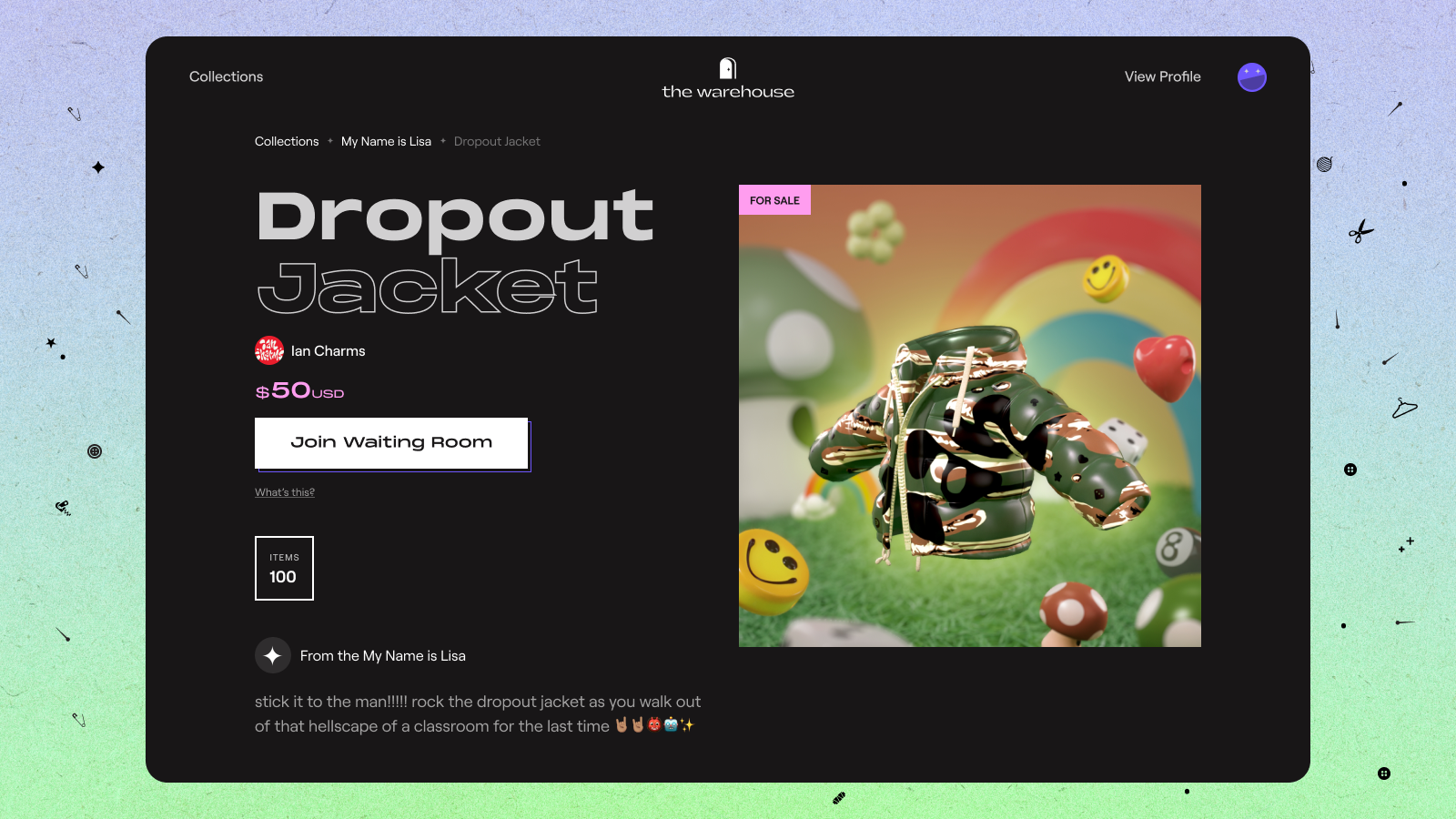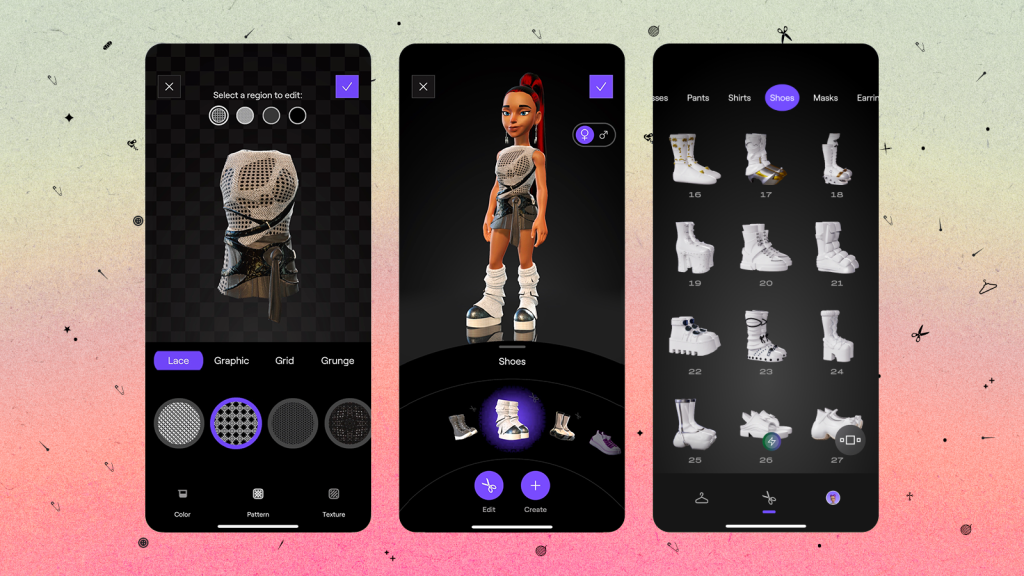Digital avatar startup Genies, known its for high-profile partnerships with celebrities such as Justin Bieber, Migos and Cardi B, has just released its long-anticipated NFT storefront, “The Warehouse.” Genies last earned a $1 billion valuation from heavy-hitting tech investors including Silver Lake and Mary Meeker’s Bond Capital during its most recent raise, a $150 million Series C round announced in April.
The Los Angeles-based company partnered with NBA Top Shot NFT creator Dapper Labs to develop the storefront on Dapper’s Flow blockchain and debuted it to a group of invite-only beta users in December last year, TechCrunch reported at the time. Now, The Warehouse is available to the general public, meaning users can download the Genies Studio app to create their own avatars and buy digital fashion items to dress them, Genies CEO and founder Akash Nigam told TechCrunch in an interview.
Genies is partnering with a handpicked group of creators to design the first set of collections available on the platform, Nigam said. One of the first collections will come from fashion photographer and influencer Tati Bruening, known on Instagram as @illumitati, where she went viral for her petition to “Make Instagram Great Again.”

Users can also leverage in-app tools to modify the clothes they purchase, allowing them to personalize items they purchase from these collections, he added.
“Creators will be selling their own avatar fashion, and the ones that they’ve customized over the past couple of months. And when they do sell out — let’s say someone sells like 100 items, and let’s say that if a fan or follower or anybody within the community decides to buy it for their own avatar, they also now have the rights to be able to edit it or DIY it within the studio platform, so they can use the tools and create a derivative collection, and then sell the derivative fashion line in The Warehouse,” Nigam explained.
Because each item is an NFT, the original creator gets a cut of the revenue each time that item is resold and owns the intellectual property behind the design, he added. Genies charges a 5% fee on each sale, allowing creators to keep the majority of the revenue they earn on each transaction, Nigam said, contrasting that with the 50%+ fee Meta charges for NFTs within its Horizon Worlds metaverse. (Meta is pushing ahead with its NFT plans too, announcing earlier this week that it would allow users to post their NFTs on both Facebook and Instagram after rolling out its own digital clothing offering in June.)
Meta isn’t the only tech company looking to carve out its own identity by helping people craft theirs using digital avatars. Reddit launched its own NFT avatar marketplace in July and earlier this month Estonian startup Ready Player Me raised $56 million led by a16z for a similar vision. Genies is certainly holding its own in the space through its celebrity partnerships and its own team — the startup counts ex-Disney CEO Bob Iger as an investor and board member.
On Genie, only approved sellers on the platform will be able to launch collections to start, though the company says it eventually wants to empower all its users to create unique 1-of-1 fashion items. Genies has made forays into fashion before — the startup partnered with Gucci back in 2020 to give the retailer’s customers access to try on new virtual designs and to buy curated digital goods.

NFT sales volumes are falling and crypto prices remain depressed, but Nigam expressed confidence about the long-term demand for digital avatars, likening them to mobile apps in their significance to the internet.
“The reason why I think avatar ecosystems are going to be the mobile apps of web3 is because you see two massive consumer trends currently being perpetuated. There’s one trend, which is the virtual trend, which is … I mean, it’s obvious. Everybody wants to exist in a 3D spatial world,” Nigam said.
Second, he added, avatars allow people to have ownership and individuality within the digital world.
“I think a lot of creators understand that they’re contributing so much back to all these different platforms, but they’re not reaping nearly enough of the benefits,” Nigam said.
Still, he expressed hesitancy to characterize and market the startup as an NFT company, although NFTs are core to its business model. He described Genies’ target demographic as the Gen Z cool kids of the internet rather than crypto-native users who view NFTs as financial assets, noting that 85% of users on the waitlist for The Warehouse are female.
“The mentality around this is so different, like, people are just obsessed with the actual digital fashion itself and creating your dream closet,” Nigam said.
Eventually, Nigam sees the company expanding into a full-fledged social network, which he said Gen Z is “starving for.” He views Facebook and Snapchat primarily as messaging apps and said Instagram is having an “identity crisis.” Meanwhile, he hopes Genies will evolve as a place where people can serendipitously meet like-minded friends on the internet — a vision to which the company has moved one step closer with its launch of the app and storefront.
“I don’t think people are even thinking about like, oh, if I buy this as an asset, do I get to unlock X, Y and Z, and does it accrue in value, and can I sell it one day,” Nigam said. “They’re just like, I just want to make dope shit, and then I want to kind of trade it and collaborate with my friends and make it too.”
Crypto gaming giant Dapper Labs takes its next shot with Genies NFT platform ‘The Warehouse’































Comment